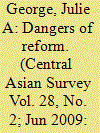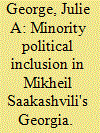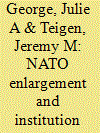|
|
|
Sort Order |
|
|
|
Items / Page
|
|
|
|
|
|
|
| Srl | Item |
| 1 |
ID:
090418


|
|
|
|
|
| Publication |
2009.
|
| Summary/Abstract |
Was the South Ossetian war of August 2008 inevitable? Although conditions between the Georgian, South Ossetian and Russian political leadership had hardened into seemingly intractable positions from 1991-2008, the manner and timing of the August war were not certain. Analysts of the events, seeking to show Georgian culpability, argue that the personality and authoritarian style of Mikheil Saakashvili led to a nationalistic policy that aimed to undermine the interests of Georgia's national minorities. While the Georgian national minority policy was not overtly chauvinistic and certainly not indicative of a full-scale crackdown on the secessionist territories, particular centralizing characteristics of Georgia's state-building programme, some of them necessary reforms after over a decade of political stagnation under Shevardnadze, contributed to the increasing tensions that were part of the lead up to the South Ossetian war.
|
|
|
|
|
|
|
|
|
|
|
|
|
|
|
|
| 2 |
ID:
125349


|
|
|
|
|
| Publication |
2013.
|
| Summary/Abstract |
"[T]he essential story of Georgian politics is a gradual, long-term trend: the slow growth in popular expectations of an accountable government that engages in fair economic and political play."
|
|
|
|
|
|
|
|
|
|
|
|
|
|
|
|
| 3 |
ID:
084752


|
|
|
|
|
| Publication |
2008.
|
| Summary/Abstract |
Georgia's Rose Revolution promised sweeping economic and political reforms, designed in part to enhance the livelihoods of ethnic and religious minority populations. The Rose events, however, occurred concomitantly with a surge in ethnic unrest. This article examines this paradox, arguing that the three major policy goals of the Saakashvili regime: the devolution of power to minorities, anti-corruption reform and state capacity building, have resulted in contradictory policy outcomes that have disproportionately hurt ethnic and religious minority enclaves.
* Thanks to APSA and ASN panel discussants Mark Beissinger and Stephen Jones and the two anonymous reviewers for their insightful comments. Many thanks to Alexander Rondeli and Temuri Yakobashvili at the Georgian Foundation for Strategic and International Studies in Tbilisi, as well as Eka Metreveli, Nana Papiashvili, Salome Tsereteli, Irakli Vacharadze, and Jeremy Teigen. Research was conducted with monetary support from the Fulbright Program and the Professional Staff Congress of the City University of New York. All errors are my own.
|
|
|
|
|
|
|
|
|
|
|
|
|
|
|
|
| 4 |
ID:
085672


|
|
|
|
|
| Publication |
2008.
|
| Summary/Abstract |
States' conscription policies reveal much about their security climate, economic constraints, political debates, and social norms. While conscription has waned among democratic countries, several states maintain it as a way to socialize and educate their citizens. As post-communist states embrace Western influence and NATO, many have ended compulsory military service. In post-Soviet Georgia, however, conscription policy is a microcosm illustrating the difficulties of bridging security vulnerabilities, political upheaval, and resource realities. Although previous scholarship predicts that security and economic needs should supersede other considerations, we find that the domestic political context looms larger for decision makers of transitioning states
|
|
|
|
|
|
|
|
|
|
|
|
|
|
|
|
|
|
|
|
|